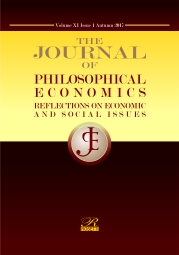From a ‘Moral Philosopher’ to a ‘Poor’ Economist
From a ‘Moral Philosopher’ to a ‘Poor’ Economist
Author(s): Soumitra SharmaSubject(s): Philosophy, Social Sciences, Economy, Special Branches of Philosophy, Sociology, Philosophy of Science, Social Theory, Socio-Economic Research
Published by: Editura Rosetti International
Keywords: Aristotle; The Arthas´aËtra; education; natural laws; moral philosophy; mathematics;
Summary/Abstract: The roots of modern ‘Economics’ are deeply buried in the moral and political philosophy of the ancient philosophers. The journey of an economist from the pedestal of a ‘moral philosopher’ to a state of ‘poor economist’ is rather long. Through the Middle Ages the ‘natural law’ approach to economics and sociology held firm. The ‘socio-economic rationalism’ of the Stoics helped this approach to develop into a ‘social science’ that later took the form of ‘moral philosophy’ of the 18th century philosophers. Since then Economics has been enriched by scientific thought of many. While Marshall and his Principles made the study of Economics popular at universities, Keynes provided a theoretical platform to the governments for their full employment policies ensuring an unprecedented economic growth for a quarter century during the post-war years. For more than a century now Economics has witnessed tremendous progress in methods and contents. Unfortunately, over the last two decades it has come under fire. Is there a new transformation underway or Economics has lost its lustre? This short essay tries to address some of such issues.
Journal: Journal of Philosophical Economics
- Issue Year: I/2007
- Issue No: 1
- Page Range: 95-118
- Page Count: 24
- Language: English

